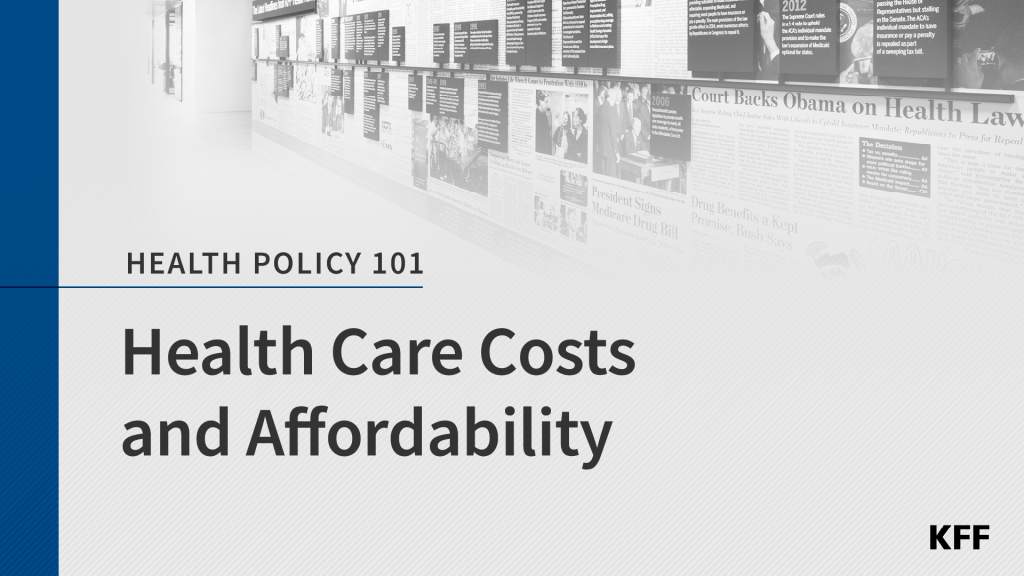Health Cost and Affordability Policy Issues and Trends to Watch in 2024
While issues of health care costs and affordability may not be at the forefront of this year’s election issues, they remain a major concern among the public.
The independent source for health policy research, polling, and news.
KFF’s policy research provides facts and analysis on a wide range of policy issues and public programs.
KFF designs, conducts and analyzes original public opinion and survey research on Americans’ attitudes, knowledge, and experiences with the health care system to help amplify the public’s voice in major national debates.
KFF Health News is a national newsroom that produces in-depth journalism about health issues and is one of the organization’s core operating programs.
Health Policy 101 is a comprehensive guide covering fundamental aspects of U.S. health policy and programs, including Medicare, Medicaid, the Affordable Care Act, employer-sponsored insurance, the uninsured population, health care costs and affordability, women's health issues, and health care politics. The Health Care Costs and Affordability chapter explores trends in health care costs in the U.S. and the factors that contribute to this spending. It also examines how health care spending varies across the population, the impact of costs on care affordability and individuals' overall financial vulnerability.
While issues of health care costs and affordability may not be at the forefront of this year’s election issues, they remain a major concern among the public.
Adult dental care can lead to high out of pocket costs for consumers, especially for those with private insurance coverage. This post analyzes a proposed provision in the HHS Notice of Benefit and Payment Parameters for 2025, and possible implications for consumers who have Marketplace coverage.
Very Few Say They Would Want to Purchase a Short-Term Plan, A Regulation Being Drafted By The Trump Administration Nine in 10 enrollees in the non-group market say they intend to continue buying their own insurance even after being told that Congress has repealed the individual mandate penalty for not having coverage as of 2019,…
This Visualizing Health Policy infographic looks at costs and outcomes of mental health and substance use disorders in the United States (US).
A new Kaiser Family Foundation analysis estimates that 6.3 million people -- 23 percent of 27.4 million non-elderly adults with a gap of several months in insurance coverage in 2015 – could potentially face higher premiums under the House’s American Health Care Act (AHCA), due to pre-existing health conditions.
As a group, older Americans are likely to see some of the biggest changes in their health insurance under the House-passed American Health Care Act (AHCA). The Congressional Budget Office projects that the number of 50- to 64-year-olds who are uninsured would rise to 10 million in 2026, about 5.
In partnership with The Washington Post, the Kaiser Family Foundation conducted the Survey of Rural America to gauge the views and experiences of people living in small towns and rural areas across the United States, and how they are similar or different from those in urban and suburban settings. This brief explores where health care fits in rural residents' political views, including attitudes toward Republican plans to repeal and replace the ACA as well as views of Medicaid. It also examines how rural Americans' health care experiences compare with their urban and suburban counterparts.
This issue brief presents an analysis of the financial burden of out-of-pocket health care spending for Medicare beneficiaries between 1997 and 2005. The analysis shows median out-of-pocket spending as a share of Medicare beneficiaries' income increased between 1997 and 2005, from 11.9 percent to 16.1 percent. For some beneficiaries, the spending burden was even greater, with 25 percent of people on Medicare spending nearly one-third or more of their income on health care.
With Medicare and Medicaid turning 50 this year, this updated video provides a brief history of both programs, including: an examination of the health care, social and political landscape that gave rise to them, the significant ways each program has evolved over five decades, and the important roles they play in the U.S. health care system. The video includes archival footage, as well as commentary and perspective from policymakers, government officials and experts.
Republicans More Likely to Expect Positive Changes Than Democrats or Independents Large Majority Favors Continued Medicaid Funding to Planned Parenthood Fielded March 6-12 as Americans were first learning about the American Health Care Act and before the Congressional Budget Office estimated its effects, the latest Kaiser Tracking Poll shows that large shares of the public…
© 2026 KFF
